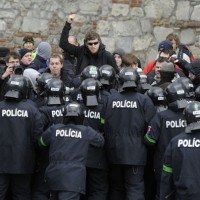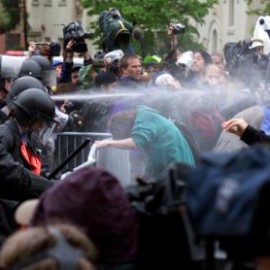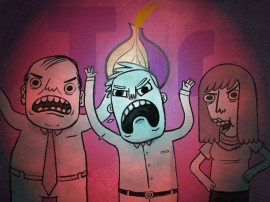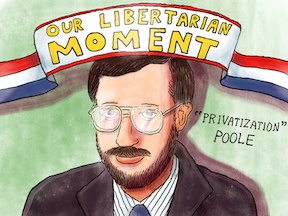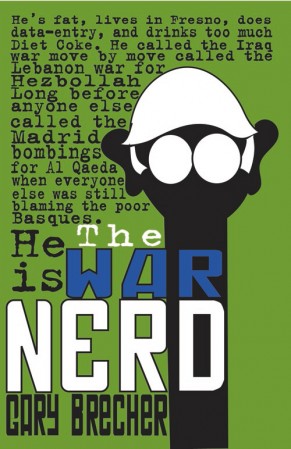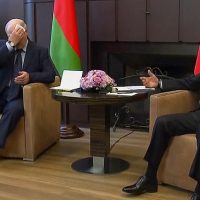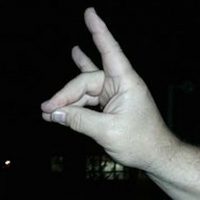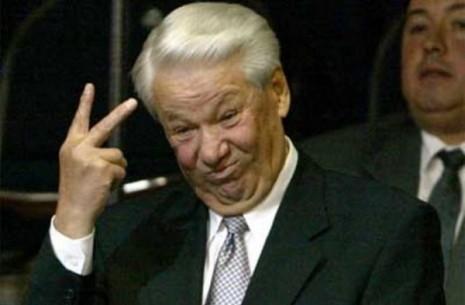
This review was originally published in The eXile on March 30, 2000
After reviewing so many well-meaning, badly-written books, it’s a pleasure to dissect the work of a skilled liar. The liar in question is Leon Aron, the book is Yeltsin: A Revolutionary Life. Aron’s book attempts a task which is, to borrow his favorite Classical allusion, “Augean”: cleaning up the filth-dripping career of Boris Yeltsin.
But though the task is, as he puts it, Herculean, Aron has one tremendous advantage: he is writing for readers who know very little about contemporary Russia. Only an audience deeply ignorant of Russia would stand for a biography of Yeltsin which in 750 pages makes only four brief references to Boris Berezovsky. Writing a Yeltsin biography which ignores Berezovsky is like writing a history of the Nicaraguan Contras without mentioning Oliver North. Yet Aron expects to get away with excluding Berezovsky from his story – and based on the reviews of this book by what passes for the American intelligentsia, he will succeed. Martin Malia has informed the readers of the Wall Street Journal that “whoever wishes to understand post-Communist Russia…must henceforth start with Mr. Aron’s path-breaking book.” The New York Times, gullible as ever, has termed Aron’s book “a fine, full-blooded portrait of Yeltsin.”
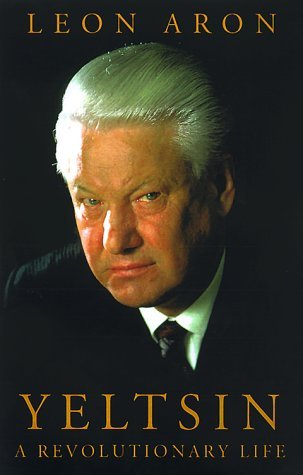
Sadly, very few of the readers who buy Aron’s book on the strength of these endorsements will know enough about Russia to see the scope of the Big Lie Aron feeds them. They will end up believing that Yeltsin and his friends were doing God’s work, or at least Adam Smith’s — rather than divvying up the plunder of a fallen empire while its stunned, exhausted people were too busy trying to survive to put up any resistance, and whose hope and faith in a better, more just future had been coapted and perverted by some of the most bloodless, amoral nihilists-posing as free-market democrats-that the world has ever seen. Just taking the loans-for-shares scheme alone — a theft that even the IMF and World Bank have disavowed — it is estimated that at least tens of billions of dollars worth of state assets were literally given away to the oligarchs (and often times even paid for by stealing the unpaid wages of Russia’s state workers and pensioners) for almost free. That alone would qualify Yeltsin as the greatest thief that mankind has ever known.
Aron has so little respect for his American readers that he actually attempts to tell them that the oligarchs aren’t really such a big deal, that they’re largely myth:
“…The secrecy in which the Russian robber barons cloaked their dealings resulted in a vast exaggeration of their wealth and power both by the Moscow rumor mill and by the resident correspondents of Western newspapers and television networks…The truth was further obscured by a deep suspicion of personal wealth…and by self-aggrandizing claims and accusations with which the perennially warring moguls puffed up their worth and which they hurled at one another through their media outlets.”
Aron’s prose slips a bit here, particularly in that last sentence. If the oligarchs are really so marginal, how is it that they apparently own all the “media outlets”? Or is ownership of the electronic media such a minor advantage? Aron simply dismisses other charges against Yeltsin without argument:
“…equally bizarre [is] the ‘theory’ that explained Yeltsin’s dependence on the oligarchs by the gifts which they showered on his family — as if the President of Russia, should he decide to do so, needed intermediaries in raiding the country’s treasury.”
One would like to ask Mr. Aron exactly what is “bizarre” about this “‘theory’.” “Intermediaries in raiding the country’s treasury” is a fairly exact description of the talents of Berezovsky and above all Chubais (whom Aron treats very delicately). It seems less than “bizarre” that Yeltsin, whose job was not to cook the books but to present a “democratic” face to the West while the cooking was in progress, would work with the leading embezzlers rather than carrying sacks of dollars out of the banks. He’s not in that sort of condition.
The one figure of the 1990’s who stirs Aron’s bile is Yavlinsky, the least corrupt of all the “reformers.” Quiz for non-Russian readers: explain why does Aron hate Yavlinsky, of all people, so intensely. In 25 words or less. [HINT: Yavlinsky, as the only authentically democratic, untainted Western-style politician in Russia, and the part-Jewish leader of the fiercest opposition Duma faction, does WHAT to Aron’s central argument that all those opposed to Yeltsin were crypto-fascist/anti-Semitic-Stalinist monsters?]
In whitewashing Yeltsin’s astoundingly sleazy career, Aron leans heavily on his readers’ worship of the free market and the power of the individual to transcend, even remake, the world around him. (In other words: successful Americans.) Playing on the paradigmatic narratives Americans absorb with their morning cartoons, Aron transforms young Yeltsin into a Siberian Abraham Lincoln, growing up in “…the Ural-Siberian tradition of diversity, acceptance and meritocracy.” Yeltsin may not have lived in a log cabin, but as Aron points out, his grandparents did. As a boy, Yeltsin rambles in the woods, explores Siberian rivers and generally gets up to all sorts of Huck-Finn deviltry (blowing half his hand off while playing with a grenade, for example), but grows up to be the hardest-working, straightest-speaking construction boss in the history of Sverdlovsk, a totally (!), incorruptible workaholic who sternly rejects every attempt at a bribe or dubious gift. To give Yeltsin due credit, one must admit that he certainly transcended that provincial prejudice in later life.
Aron is at his best when his knack for hagiography has the fewest obstacles (ie facts) to overcome. This means that his early chapters about Yeltsin’s life in Sverdlovsk are his best. When Boris is summoned to Moscow — his drive and goodness recognized at last — Aron’s task becomes much harder.
Aron has two strategies for wrestling his readers into respecting Yeltsin. First, he uses his early chapters to paint the Soviet system so black that a naive reader will accept any change as an improvement. In the process he makes Yeltsin’s task literally Herculean – and I mean literally: Aron consistently compares Yeltsin’s tasks to the labors of Hercules, above all to the cleaning of the Augean stables. (Though, in a momentary lapse, he fudges a bit by describing Yeltsin as “both Augeas and Hercules” — that is, the man responsible for the mountain of dung, as well as its remover.)
Aron’s not shy about enlisting a plurality of Classical heroes, either. When Hercules tires, enter Sisyphus. Here is Aron’s depiction of Yeltsin after he has been rebuked by the CPSU:
“Yeltsin sat on the dais, motionless, his head in his hands. The monstrous boulder that he, day and night, had pushed up, up, up the steep slope, through briars, his hands cut and bleeding, his knees in muck, his sides bruised and his heart strained – had finally crushed Sisyphus.”
If I may resort to the argot of my native malls: what crap. The torture to which Yeltsin has been subjected is no more than a public scolding by his fellow apparatchiks, to which Yeltsin reacts not by standing up for his rights in Lincolnesque fashion but by groveling, as Aron admits, “like a star defendant of Stalin’s show trials in the 1930’s.” And Yeltsin, when challenged, shows that he can grovel with the best of ’em:
“I am very guilty before the Moscow party organization, very guilty before the GorKom, before the buro, before all of you and, of course, I am very guilty before Mikhail Sergeevich Gorbachev, whose authority is so high in our country and in the whole world….”
But Yeltsin groveled, not before Stalin but…Gorbachev! It’s no shame to grovel before Stalin — God would grovel before Stalin — but to react to a tonguelashing by his doddering epigones of 1987 vintage, as Yeltsin did, is hardly Sisyphus-level heroic endurance.
Aron’s other strategy for rehabilitating Yeltsin is simple old Russophobia. He says outright that Yeltsin’s opponents are anti-Semitic fascists, and offers several grotesque cartoons out of Zavtra as evidence. In other words, Russians who objected to seeing their jobs, their savings, their country whisked away; who were bothered by the starvation and entropy of the countryside; who found it suspicious that every item of value in the former USSR had passed, somehow, into the hands of a dozen master embezzlers; that all these people were no more than Jew-baiting racists. Now that is what Dr. G. used to call the biiiiiiiiiiig lie. 900 pages of it. Now that’s big.
The only remaining issue for the reader is guessing how big was Aron’s compensation package for producing this shameless encyclopedia of court flattery. We’d bet that it was real big. And judging by the early reviews, it was money well spent.
John Dolan is co-host of the Radio War Nerd podcast. Subscribe here.
July 12th, 2016 | Comments (9)



